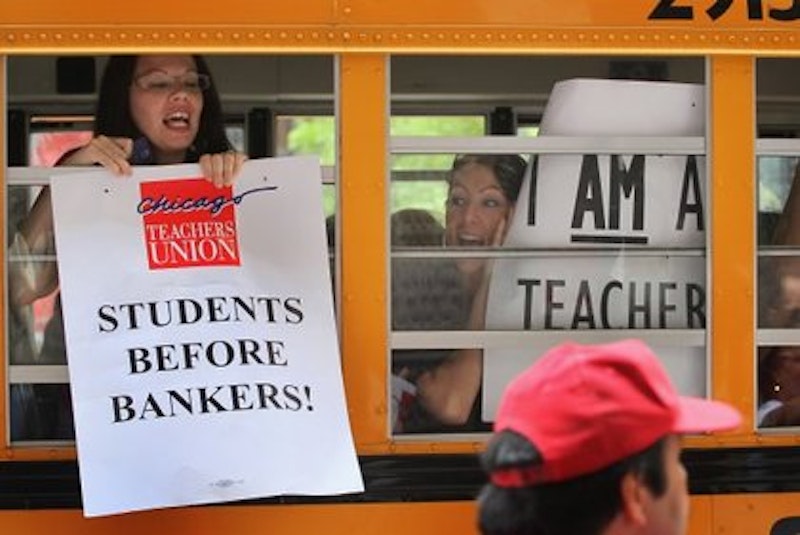On September 10, the Chicago teachers union struck for the first time in 25 years. Mayor Rahm Emanuel has said the strike is the teachers’ "choice," which it is in some sense. But the real surprise is that they didn't make that choice a whole lot earlier.
Chicago teachers and their unions, like those throughout the country, have been under assault for years. Politicians, Democrat and Republican, have decided that the way to improve schools is to abuse teachers, and they've gone about that task with the usual combination of bureaucratic efficiency and numbing incompetence. As an example, in Chicago in many cases all the teachers at a given school will be fired at the end of a year… and then rehired sometime during the summer. The only purpose appears to demonstrate to teachers that they are held in contempt, and I guess to raise their stress levels.
Along these lines, Emanuel last year began working to increase the school day. By adding an hour and a half onto each day, Emanuel effectively was proposing increasing teacher hours by 20 percent without any promise of increased pay. When there was pushback from the union, Emanuel and Chicago Public Schools (CPS) began giving financial incentives to individual schools to increase the school day. He also allegedly used a teacher screening exam to try to eliminate potential hires who disapproved of the longer hours.
The fight over longer days was resolved before the summer, in an incredibly confusing, not to mention stupid, manner. Here's how the Chicago Tribune described the compromise.
Under the agreement, CPS will hire 477 teachers in noncore subjects such as music, art, foreign language and physical education. That will allow elementary school teachers to continue to work seven-hour days, which include teacher prep time and lunch. At the high school level, teachers will put in an additional 14 minutes.
The current school day runs five hours and 45 minutes for most elementary schools and seven hours for most high schools. That will be extended to seven hours for elementary schools and 71/2 hours for high schools.
Clear as mud. What’s happened is that the school day was extended, but teachers weren't teaching longer hours, though they still were on site. Doesn't seem like much of a deal to me. Even if you're not technically working, who wants to be at the office longer without getting paid more?
But apparently that's not why the teachers are striking. Instead, the main issue at this point is a new evaluation system that would tie teacher pay and retention to standardized test scores.
Whether or not standardized test scores have anything to do with teacher quality is still controversial in its own right. Perhaps such a system could work if implemented in good faith and with teacher input. But CPS has shown pretty clearly that it will not operate in good faith, and that it is contemptuous of both teachers and their input. No wonder a staggering 90 percent of teachers voted to authorize the strike, easily beating the ridiculously high 75 percent margin set by law.
So on Monday teachers were out with red shirts on picket lines. Some schools in Chicago are open for a half-day so parents have somewhere to leave their kids—though as you'd expect form CPS, things are chaotic. In the meantime, karate schools, theaters, and everybody else with any kind of kids programming are instituting special strike programming, helping out those desperate parents who don’t have enough disposable income to pay for child care. And, of course, those of us with kids in private school are feeling pretty seriously relieved.
Everybody says that the strike hurts students, and it does, especially those students who don't have the resources to make alternate arrangements. But the real damage isn't the strike, but its cause. Local governments want to appear to be doing something to improve education, but they don't want to pay for it. The result is constant bureaucratic rejiggering, followed by the inevitable bullying of teachers when the unfunded miracle fails to transpire. That's no way to attract talented people to work in the schools, and, indeed, I'm constantly amazed that CPS can get anybody to teach at all considering the way they treat their employees. Though of course this week, finally, they can't.

